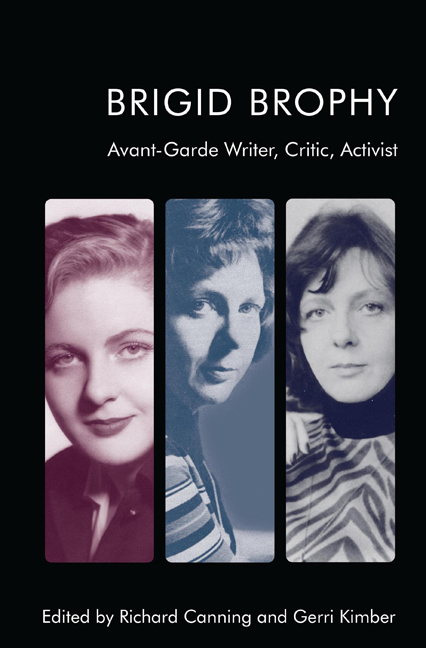Book contents
- Frontmatter
- Contents
- List of Illustrations
- Acknowledgements
- Introduction
- 1 Embodying the Fragments: A Refl ection on the Reluctant Auto-Biography of Brigid Brophy
- 2 Brigid Brophy’s Paradoxical World of Childhood
- 3 Intr oduction to ‘The Librarian and the Novel’
- 4 The Librarian and the Novel: A Writer’s View
- 5 Penetrating (the) Prancing Novelist
- 6 ‘Shavian that she was’
- 7 ‘Il faut que je vive’: Brigid Brophy and Animal Rights
- 8 Brigid Brophy’s Phenomenology of Sex in Flesh and The Snow Ball
- 9 Letter to Brigid
- 10 Encoding Love: Hidden Correspondence in the Fiction of Brigid Brophy and Iris Murdoch
- 11 ‘Heads and Boxes’: A Prop Art Exhibition Collaboration by Brigid Brophy and Maureen Duffy
- 12 Prancing Novelist and Black and White: Experiments in Biography
- 13 ‘Mo nster Cupid’: Brophy, Camp and The Snow Ball
- 14 ‘A Felicitous Day for Fish’
- 15 The Dissenting Feminist
- 16 A Certain Detachment?
- Notes on Contributors
- Index
3 - Intr oduction to ‘The Librarian and the Novel’
Published online by Cambridge University Press: 17 October 2020
- Frontmatter
- Contents
- List of Illustrations
- Acknowledgements
- Introduction
- 1 Embodying the Fragments: A Refl ection on the Reluctant Auto-Biography of Brigid Brophy
- 2 Brigid Brophy’s Paradoxical World of Childhood
- 3 Intr oduction to ‘The Librarian and the Novel’
- 4 The Librarian and the Novel: A Writer’s View
- 5 Penetrating (the) Prancing Novelist
- 6 ‘Shavian that she was’
- 7 ‘Il faut que je vive’: Brigid Brophy and Animal Rights
- 8 Brigid Brophy’s Phenomenology of Sex in Flesh and The Snow Ball
- 9 Letter to Brigid
- 10 Encoding Love: Hidden Correspondence in the Fiction of Brigid Brophy and Iris Murdoch
- 11 ‘Heads and Boxes’: A Prop Art Exhibition Collaboration by Brigid Brophy and Maureen Duffy
- 12 Prancing Novelist and Black and White: Experiments in Biography
- 13 ‘Mo nster Cupid’: Brophy, Camp and The Snow Ball
- 14 ‘A Felicitous Day for Fish’
- 15 The Dissenting Feminist
- 16 A Certain Detachment?
- Notes on Contributors
- Index
Summary
Working in the public library system during the late 1970s and early 1980s was not a particularly rewarding experience. It was at best – to quote from The Pilgrim's Progress, one of the fifty works of English literature that Brigid Brophy felt the world could do without – a ‘slough of despond’. The Minister for Local Government had said ‘the party's over’. There were to be cuts in spending, and libraries, always the Cinderella service, were a prime target. Many libraries were threatened with reduced opening hours or even closure. There was talk of charging for library use, for the loan of fiction; charges for museum and gallery entrance had already been introduced.
In 1975 I joined the library service of the London Borough of Tower Hamlets. The authority had not really come to terms with the Amalgamation of London Boroughs Act of ten years before. Three East End authorities – Stepney, Bethnal Green and Limehouse – were amalgamated to become the London Borough of Tower Hamlets. They were not really hamlets, nor were they in the shadow of the Tower; and there was little evidence of cooperation. Much resentment lingered, with rivalry and personality clashes between older members of staff still wedded to their former boroughs. However, these same staff would temporarily unite against incoming staff, especially newcomers who had gained a professional library qualification.
The older staff claimed they knew from years of experience and from being local exactly what the readers wanted. ‘Libraries as supermarkets’ was the ideal. Detailed and informed discussion at book selection meetings was taken to be a farce, and the only promotion of book stock thought necessary was the prominent siting of the returned books trolley on the basis that readers just wanted to read what other readers had read. New staff took a different perspective. The borough was changing and the readership with it. The old attitude of ‘give them what they want’ was passive, not pro-active. The bulk of the issues were fiction: genre fiction, bought by the yard, and spine-labelled Romance, Crime, Western, Sci-Fi. New fiction was not encouraged, rarely bought and never promoted or circulated between libraries.
- Type
- Chapter
- Information
- Brigid BrophyAvant-Garde Writer, Critic, Activist, pp. 31 - 36Publisher: Edinburgh University PressPrint publication year: 2020



